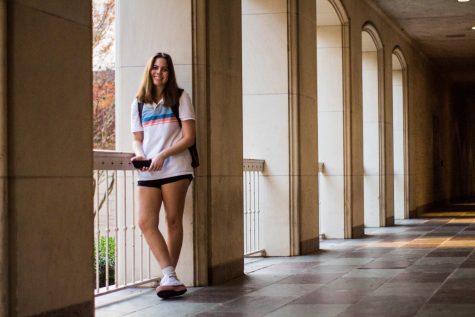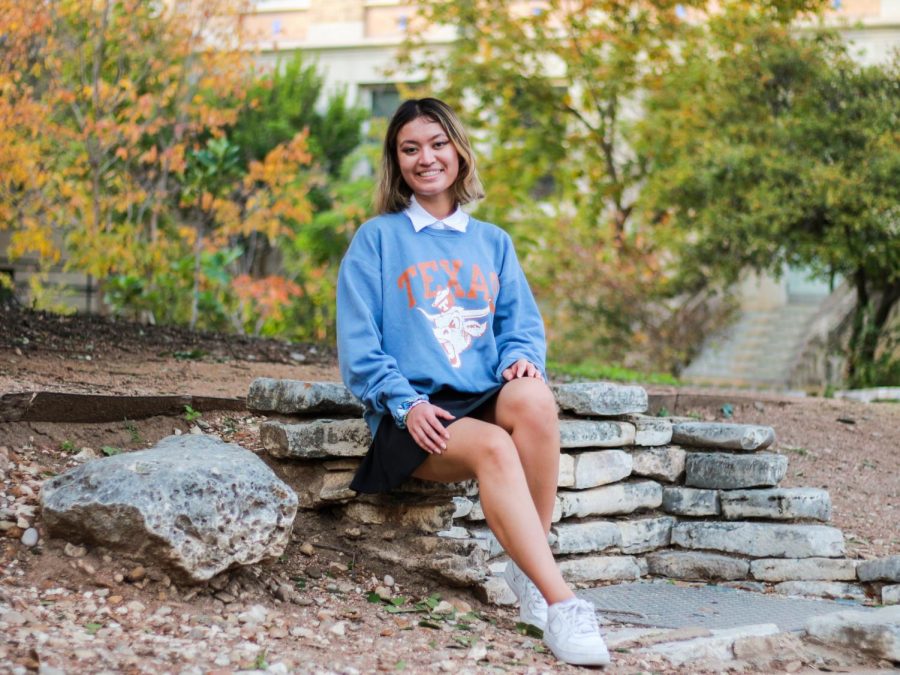UT students, staff reflect on experiences with racial passing
December 5, 2021
Disliking her paler skin compared to other darker-complected Hispanics growing up, Rachel González-Martin spent hours lying under the sun willing herself to tan. Only burning and turning red, she grew frustrated. González-Martin wanted others to easily recognize her as Hispanic.
“There’s who we know we are and how we tell our own story, but we can never escape from what people see in us or read from our appearance,” the associate professor of Mexican American and Latina/o studies said.
Racial passing — a term used to describe those perceived as a member of another racial group than their own — can affect how closely people connect to and feel a part of their communities. For UT students and staff, the process of navigating different cultural stereotypes and learning to embrace their identities regardless of their appearance remains a lifelong project.
Growing up in Oakland, California, with very few fellow Hispanics, González-Martin felt she needed to physically show her identity. However, as she’s grown older, she said she’s learned to accept her own meaning of belonging to a community aside from outside biases.
“If we’re criticized from within our community as not being enough or not being the right color, but also seen as different or exotic culturally from an outside perspective, then we have no home place,” González-Martin said. “We’re trapped in the middle.”
From her personal and academic experiences, like doing field research for her book “Quinceañera Style: Social Belonging and Latinx Consumer Identities,” González-Martin said she saw how many racially passing people feel like they don’t fit in. González-Martin said practicing celebrations like Quinceñeras or speaking cultural languages helps those who feel like they don’t belong connect to their communities.
“Connecting to these practices helps us process or externalize some of the anxieties that we have about things we can’t control like skin tone, hair texture and body type,” González-Martin said. “We’re maneuvering in between places and the expectations of the world.”
Kaitlyn Gomez, a radio-television-film sophomore, said she’s used to garnering surprised reactions from friends when she speaks Spanish in front of them. After getting asked repeatedly about her identity, Gomez said she now incorporates Spanglish into her everyday conversations since she doesn’t fully speak Spanish.

Gomez said she didn’t start to think about the idea of white passing until she arrived at UT because she grew up in the Rio Grande Valley, a predominantly Hispanic region. For those who don’t feel like they fit into their community, Gomez recommends finding people they can relate to.
“In the Valley, everyone’s Hispanic,” Gomez said. “So it’s whatever — everyone knows (you’re Hispanic). But (in Austin) I try to be more proud of my heritage because not everyone knows. There are so many people who are feeling alone or like they don’t fit in. Befriend them and stick with them.”
Growing up in the small city of Amarillo, Texas, pre-public relations sophomore Faye Haynes said she didn’t see a lot of Asian representation in the classroom. Haynes said classmates often thought she was Hispanic or white, which made her anxious and not feel “Filipino enough.”
Haynes’ biracial identity — with a white father and Filipino mother — added to her identity-based anxieties. She said she felt embarrassment when seen with both parents since people would stare. Since coming to UT, Haynes sees more Asian representation, and though she still feels like she doesn’t look like the stereotypical Asian image, she feels more comfortable with her community.
“It’s been a massive identity crisis for me growing up,” Haynes said. “I used to not be comfortable at all with the term ‘biracial’. (I felt like) I had to be one or the other. Coming here, more people are mixed like me and they’re fine with that. It’s helped me make peace with knowing that ‘biracial’ is not a bad word.”
However, because of her mixed identity, Haynes said she feels privileged at times because of her ability to racially pass as white. She said she feels guilty when with her Filipino mom, especially when her mother receives rude comments about her ethnicity and Haynes doesn’t.
“My Asian friends don’t have the privilege of being ambiguous,” Haynes said. “It makes me feel really guilty because I can easily lie about my identity while they can’t.”
When she moved to the U.S. from Belgium, graduate student Aja Mujinga Sherrard felt a disconnect between her appearance and the way people perceived her. Sherrard said in the U.S., she often feels as though she has to prove her Blackness since she has a light complexion.
“The struggles have changed from a sense of longing for connection in Black communities to being within Black communities and feeling ashamed for the space in which I appeared white,” Sherrard said. “(I’ve had) to make peace with not only Blackness, but also for whiteness.”
Now, Sherrard said she works on having a sense of belonging “from the inside out, rather than outside in.” She said she prefers to understand her own belonging to her community rather than how others might reduce her and her family’s history to a single category.
“Don’t exclude yourself on anyone else’s behalf,” Sherrard said. “Don’t decide that someone has rejected you before you say so (and) that you don’t belong. Try not to cut half of yourself just to fit in the community you’re attached to. Heal that fight in your own body and mind first.”











